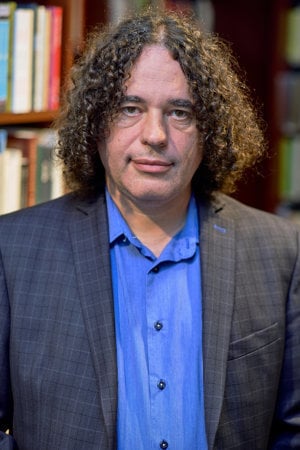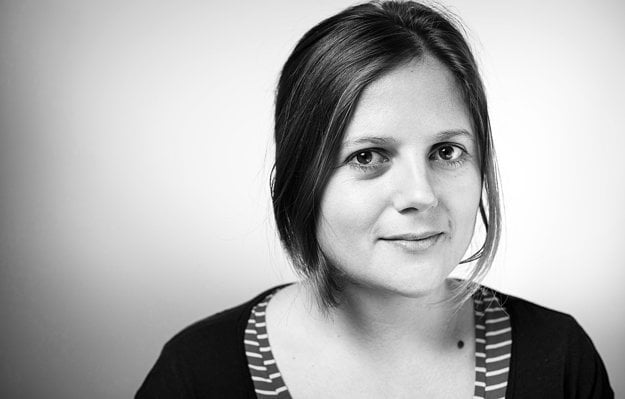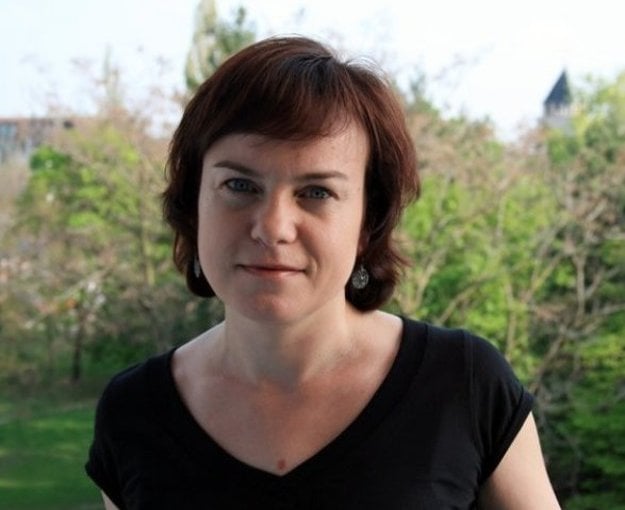The journalist Jan Kuciak was found shot to death at his home in Slovakia
BRATISLAVA, Slovakia - A 27-year-old Slovak journalist who had been investigating corruption has been found shot to death at his home along with his fiancée, authorities said Monday.
The killing - which appeared to be the first targeted slaying of a journalist in Slovakia’s modern history - was immediately condemned by officials, who vowed to investigate.
The journalist, Jan Kuciak, and his fiancée, Martina Kusnirova, both 27, appear to have been killed Thursday in the village of Velka Maca, in western Slovakia, according to the office of the general prosecutor. Their bodies were found Sunday after Kusnirova’s mother was unable to reach her.
Kusnirova was shot in the head and Kuciak in the chest, authorities said.
“If it turned out that the death of the investigative reporter was connected to his work, it would mean an unprecedented attack on the freedom of press and democracy in Slovakia,” Prime Minister Robert Fico said in a statement.
The killings were condemned by the European Union and by journalists across Slovakia.
“Murder of journalists is a clear sign of a crime against one of the most important pillars of liberty: freedom of speech and the right of citizens to check the powerful and those who break the law,” a group of top Slovak news editors said in a statement. They were joined by colleagues from the Czech Republic - which until the end of 1992 was joined with Slovakia as one country - and from Reporters Without Borders and other human rights groups.
Antonio Tajani, president of the European Parliament, recalled the killing in October of Daphne Caruana Galizia, a Maltese investigative journalist, and said the body would not rest until justice was done.
“The EU cannot accept that a journalist is killed for doing his job,” he said. “I call on Slovak authorities to launch a thorough investigation, with international support, if needed, for Jan Kuciak.”
Kuciak had worked for three years for a Slovak news portal, Aktuality.sk, that is published by Ringier Axel Springer, a joint Swiss-German media company.
“We are shocked and stunned about the message that Jan Kuciak and his companion obviously have been the victim of a cruel assassination,” the company said in a statement. It said that if the crime was intended “to deter” the company from uncovering any misconduct, “we will use this as an opportunity to take our journalistic responsibility” with even greater determination.
At a news conference, the top police official, Tibor Gaspar, said the killings were most likely connected to Kuciak’s reporting. Investigators were trying to piece together what he had been working on most recently.
The country’s elite was unified in condemning the deaths, and the government offered a reward of 1 million euros to anyone with information leading to the killer or killers.
“I am shaken and terrified that something like this could happen in Slovakia,” President Andrej Kiska said in a statement. “The coldblooded murder of young people is an atrocity that has to be punished. We have to find the people who did this and secure the safety of journalists.”
Justice Minister Lucia Zitnanska said in a statement: “Slovakia can’t be a country where journalists are murdered.”
Kuciak, who studied journalism in Nitra, Slovakia, had written about shady financing or tax evasion in companies connected to well-known Slovak oligarchs and businessmen, many of them linked to the governing party, or to two powerful men: Robert Kalinak, the interior minister, and Jan Pociatek, a former finance minister. His most recent articles focused on a Slovak oligarch, Marian Kocner, and his companies.
In October, Kuciak wrote on Facebook that he had filed a report on Kocner for threatening him the previous month. Kocner, he wrote, said he would “collect dirt” on the reporter and his family and would not stop until he would “never write anything again.”
On Monday, Kocner issued a statement deploring the killings and calling allegations that he had threatened Kuciak absurd.
Last fall, Kalinak, the interior minister, ridiculed journalists who asked about the threats. “This is what you do, dig up dirt,” he said.
Slovakia, then part of Czechoslovakia, emerged from communist rule in 1989. During its transition to democracy, in the 1990s, journalists were regularly attacked and threatened for their work when Vladimir Meciar governed as prime minister with a populist and authoritarian style.
Slovakia joined the European Union in 2004 and is generally seen as having a robust legal system. Last year, it was ranked 17th in the 2017 World Press Freedom Index. However, media ownership is heavily concentrated in the hands of a few businesspeople, and dissenting voices often face pressure.
Veronika Remisova, an opposition lawmaker, said Fico, the prime minister, and Andrej Danko, speaker of parliament, had created an environment of hostility for journalists by demeaning and criticizing them publicly. She and other opposition politicians called for Kalinak, the interior minister, to step down because, they said, police had failed to protect Kuciak.
On Monday night, candles were lit in Bratislava and other cities in Slovakia and in Prague in memory of the slain journalist and his fiancée.
Peter Nagy, another journalist, who is expecting a baby in three months, said he and his wife were planning a demonstration on March 13 to demand accountability.
“We don’t want it to be born to a society where people are afraid to speak up and journalists are afraid to work,” he said in an interview. “Murder of a journalist is a murder of society, of the voice of public and of our values.”
Source
Beating, burning cars and paranoia - Slovak investigative journalists talk about their work
Slovak journalists admit they were often afraid but hardly any of them thought their adversaries would dare kill a journalist.
Slovak investigative reporters are used to threats and blackmail. Things get worse when they are physically assaulted or their cars are burnt.
The news about the murder of their colleague Ján Kuciak has left them shocked. They say journalists have so far had to face lawsuits for their work, not shotguns.
Arpád Soltész

Arpád Soltés (Source: Dušan Kittler)
commentator of the noviny.sk website
We were all startled and I think even he did not count on anything like that. This removed two psychological barriers. For the first time in Slovakia's history a journalist was killed. Secondly, he was killed along with his partner. Not even the mafia used to murder each other along with their families. That is a Moscowian signature. Now we will see if Andrej Kiska was right, whether we a mafia state. We will see how the state will handle this case.
There were situations when I feared for myself or my close ones. I can even say that I had lived in fear for ten years due to my work. Everybody who does this job knows this fear and has to learn to live with it.
I experienced an assault in the toilet of one bar, when a man approached me, broke my face, broke my ribs, and without a single shout or a single word walked away. It was a professional job.
This kind of life has an impact on a person. At the time when I was receiving threats, it happened to me that two people wearing jogging suits and leather jackets followed me, one of them even put his hand under his jacket as if to reach for a gun. I almost soiled my pants, and if I had been armed, I would probably have tried to fire the first shot. But it turned out that the man was reaching for his police badge and he introduced himself as a member of the criminal police. He only needed to check on a banal incident that had happened near my home.
Monika Tódová

Monika Tódová (Source: Tomáš Benedikovič)
Denník N reporter
This murder is a shock for me and for all journalists in Slovakia. None of us probably thought that a journalist could be murdered here for doing his job. We thought we only risked a lawsuit or a police hearing. These things happen in the eastern countries.
I knew Ján as a young and very clever journalist with enthusiasm for his job. He was a very decent, ordinary person, who liked to go in-depth, recently for instance to uncover the structure of tax fraud.
It started back in 2016 with the Bašternák case and the first suspicions that there are chosen people in Slovakia who face no consequences when they commit tax fraud despite the fact that the tax authorities are aware of it.
Tom Nicholson

Tom Nicholson (Source: SITA)
journalist, writing for the Sme daily
I have known Jan Kuciak since 2012. He wrote me after the Gorila case broke out, to support me and to say that he would also like to do this job. He was often very generous and would send me tips. He saw it all as a fight for the right thing rather than a fight between journalists. His death surprised me just like the murder of [a known lawyer] Ernest Valko did.
But I thought it might not be like with Marián Kočner and with Ladislav Bašternák, the way some media are alleging now. These people have been doing business in Slovakia for 20 years and there has never been a murder.
Ján worked on information that we have had for a longer time, about Italians suspected of stealing EU funds here. This could be a trace. Information that comes from 2015 is probably from the secret service SIS and there is no doubt that the Slovak state bodies do have information about these frauds. These Italians were so self-confident that they publicly supported the politics of Smer on their Facebook page.
If there is any proof of links with them, I do not see how some politicians could continue working. On the other hand, there have been many scandals linked with Smer in the past and they went on.
When I worked in Slovakia in the past, I feared for my life several times. I would also ask myself if I weren't getting paranoid, but that is probably part of the job. I would also discuss with my then wife if it made sense to write about such things when one has children. But I would always console myself that journalists do not get murdered in Slovakia.
My current wife is telling me to stop it.
Zuzana Petková

Zuzana Petková (Source: SME archive)
Trend weekly reporter
Ján Kuciak was my friend, we worked on several topics together. He did not care about exclusiveness, but mostly bringing scandals to the end. He was happy to share his information and help others. The last documents I gave him concerned the VAT returns of businessman Marian Kočner. He was able to find links in them that I would overlook, he had a great sense for detail. He probably found something big now and that is why he became the victim of a contract murder.
I am very sorry about what happened and I think the negative mood towards journalists comes from above. About half a year ago, Interior Minister Robert Kaliňák belittled the threats that Jan reported to the police and filed a criminal complaint. When politicians belittle the work of journalists and their social status drops, the social protection of journalists drops too. But I would never think that it could reach the point when I would have to attend the funeral of my friend.
I have experienced several threats, but I never paid much attention to them. When I was writing about the series of VAT frauds that concerned several VIPs, my car did catch fire under peculiar circumstances. I did not report it to the police, I rather blamed the heat and the overheated engine. Now that I see what happened to Jan, I would probably treat it differently. Later on, the car of one of my sources who provided me with information about these topics also burned.
Júlia Mikolášiková

Júlia Mikolášiková (Source: Archive of J. Mikolášiková)
Blogger, former reporter for Nový Čas and aktualne.sk
I have followed the work of Ján Kuciak and I met him once. He also wanted to report on people from the underworld. When I learned about his murder in the morning, I could not believe it could be connected with his articles. I instead assumed it was a robbery.
When the police admitted it was probably linked with his work, I was surprised. Ján Kuciak filed a criminal complaint in September about blackmail. Then I was surprised that the police let ordinary officers from a regional department deal with the case. It is in line with the law, but the police could have been more thorough and forwarded the case to a department with operatives.
I was a victim of blackmail and I also filed two criminal complaints. Another case was the preparation of the murder of a prosecutor and the suspect talked about me, so they heard me as a witness. Both complaints were dismissed. The prosecutor argued when dismissing one that I was a journalist writing for a publishing house that also publishes a tabloid newspaper. I write about first-degree murders so I have to bear more criticism. I have been complaining about the methods of police officers but to no avail.
Pavol Fejér

Pavol Fejér (Source: RTVS archive)
former host of Reportéri RTVS
It is terrible what has happened. Even though it is being presented as a single case in Slovakia, it is probably part of a wider context. There is a general feeling that justice does not exist for all. Journalists who point it out get called various names. Politicians narrow down the space for their critics and tabloid and manipulative journalists are put forward. This is also seen from the power-related changes in RTVS and the cancellation of the Reportéri investigative show.
I have felt fear as a journalist several times. On the other hand, I have never been a target of extreme attacks. It is probably due to the fact that as a journalist I have never dealt with big economic crimes. Also, when I worked out in the field, aggressive people always saw that there was a camera there and that discouraged them from assault.
Source